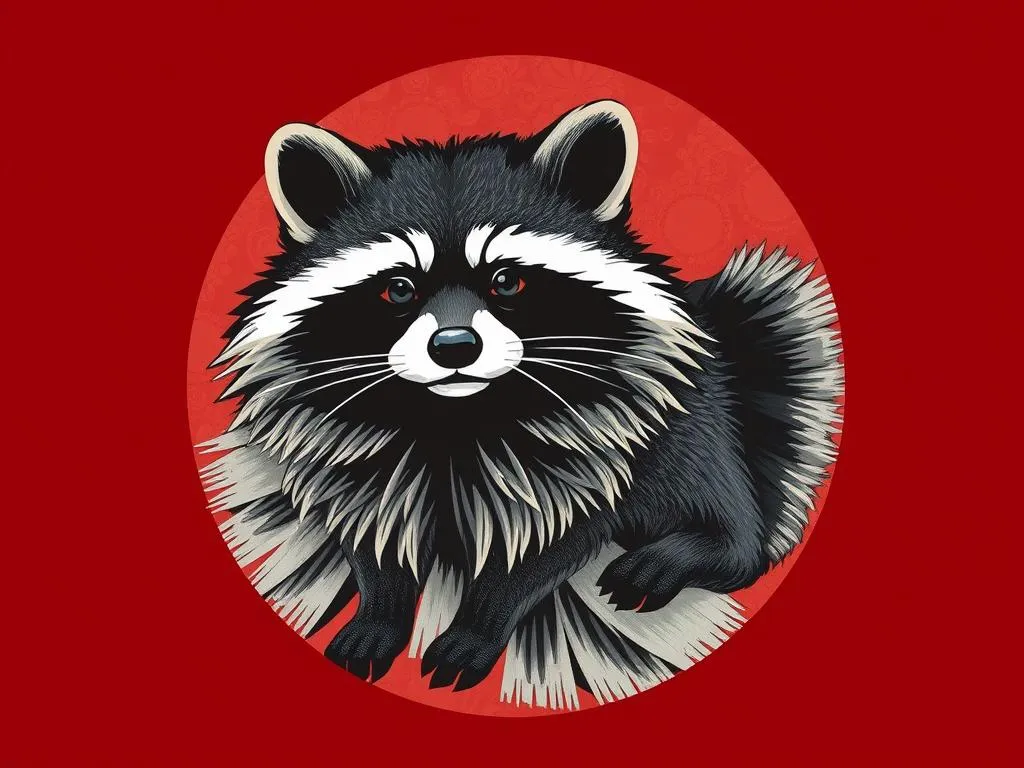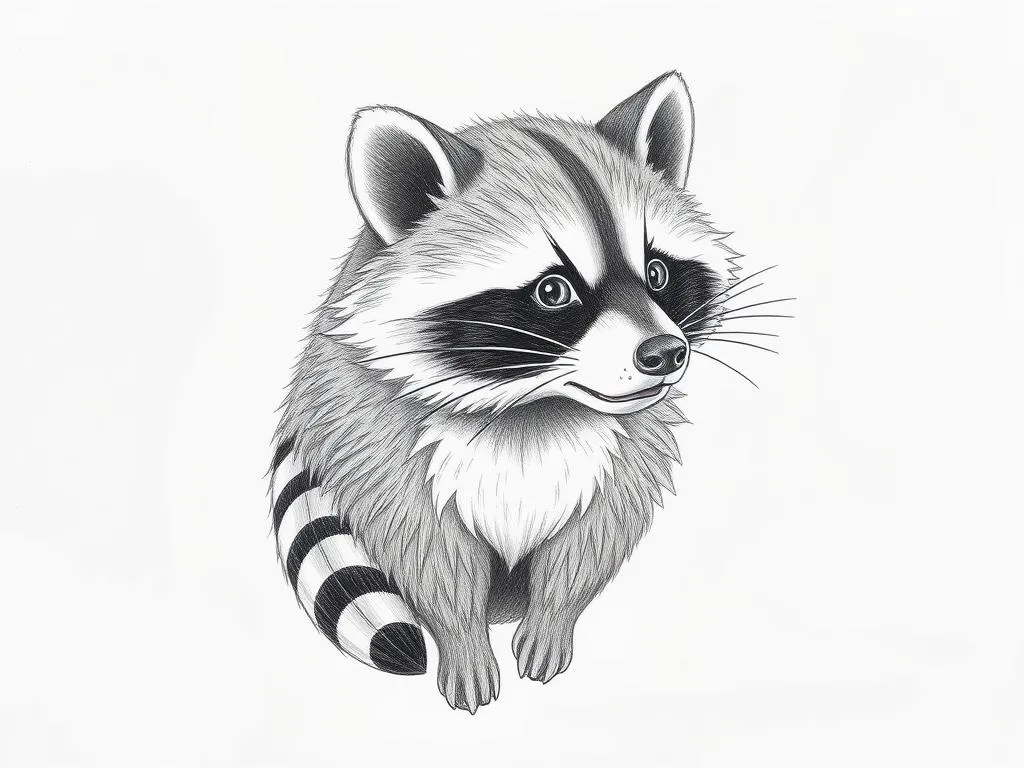The Enigmatic Symbolism of the Japanese Raccoon Dog

Disclaimer: Some images on this website are AI-generated artworks and may not accurately represent real animals.
The Japanese raccoon dog, or Tanuki, is a creature steeped in mystery and rich symbolism in Japanese culture. Known for its unique characteristics and fascinating folklore, the Tanuki embodies qualities that resonate deeply with cultural significance and spiritual meaning. This article delves into the various aspects of the Tanuki’s symbolism, its role in dreams, and its modern interpretations, offering a comprehensive understanding of this enchanting animal.
Understanding the Japanese Raccoon Dog
Taxonomy and Characteristics
The Japanese raccoon dog (Nyctereutes procyonoides viverrinus) is a subspecies of the raccoon dog, native to Japan. Unlike its North American counterpart, the Tanuki is more closely related to foxes and wolves than to raccoons. Here’s a quick overview of its physical characteristics:
| Physical Trait | Description |
|---|---|
| Size | Approximately 50-60 cm in length |
| Weight | Typically ranges from 6-10 kg |
| Fur Color | Dense, shaggy fur; usually gray-brown |
| Facial Features | Mask-like markings resembling a raccoon |
| Tail | Short and bushy |
The Tanuki is primarily found in forests, grasslands, and rural areas across Japan. It is a nocturnal omnivore, feeding on a varied diet that includes fruits, insects, and small animals. Known for its adaptability, the Tanuki is often seen scavenging in urban settings, demonstrating a remarkable ability to thrive in diverse environments.
Cultural Significance in Japan
The Tanuki holds a prominent place in Japanese folklore and history. Traditionally seen as a shape-shifting creature, the Tanuki can transform its appearance at will, often taking on human forms. This aspect of its character has made it a popular figure in Japanese myths and stories, where it is frequently depicted as a trickster with a dual nature.
Unlike other canids, the Tanuki is often portrayed with a playful demeanor, embodying both wisdom and folly. This unique portrayal sets it apart from more serious and ominous representations of animals in other cultures.

Symbolism & Spiritual Meaning
Transformation and Adaptability
One of the most significant aspects of Japanese raccoon dog symbolism is its association with transformation and adaptability. The Tanuki’s ability to shapeshift symbolizes flexibility and change, qualities that resonate deeply with the human experience. In many folktales, the Tanuki uses its powers to navigate challenges, reminding us that life is often about adapting to new circumstances.
The stories of the Tanuki shapeshifting serve as powerful metaphors for personal growth and the importance of embracing change. Just as the Tanuki transforms its appearance, individuals can also evolve in response to their life circumstances, demonstrating resilience and adaptability.
Luck and Prosperity
The Tanuki is also a symbol of good fortune and prosperity in Japanese culture. Statues of Tanuki, often characterized by their round bellies and jovial expressions, are commonly found at the entrances of homes and businesses. These statues are believed to attract wealth and bring good luck to their owners.
The association with prosperity is further emphasized through various customs and rituals. In many regions of Japan, the Tanuki is celebrated during festivals, where people honor its role as a bringer of good fortune. This cultural significance illustrates the deep-rooted belief in the Tanuki’s ability to influence one’s financial well-being.
Playfulness and Mischief
The Japanese raccoon dog is renowned for its playful and mischievous nature. In folklore, the Tanuki is often depicted as a trickster, engaging in pranks that challenge societal norms. This representation highlights a balance between wisdom and folly, as the Tanuki teaches valuable lessons through its antics.
The playful nature of the Tanuki serves as a reminder that life should be approached with a sense of humor. Its tales encourage individuals to embrace joy and spontaneity, suggesting that laughter and lightheartedness can lead to a fulfilling life.
The Japanese Raccoon Dog in Dreams
Common Dream Interpretations
Dreams featuring the Japanese raccoon dog can hold significant meaning. Encountering a Tanuki in a dream may symbolize a need for transformation or adaptability in one’s life. It often indicates that the dreamer is facing changes or challenges and may need to embrace flexibility to navigate through them successfully.
| Dream Scenario | Interpretation |
|---|---|
| Seeing a Tanuki | A sign of upcoming changes and adaptability needed |
| A playful Tanuki | Encouragement to embrace joy and spontaneity |
| A shapeshifting Tanuki | Suggests personal transformation and growth |
Exploring Personal Significance
Personal experiences and cultural backgrounds can influence dream interpretations involving the Tanuki. For those with a deep-rooted connection to Japanese culture, the Tanuki may embody specific traits or lessons that resonate on a personal level. Reflecting on these connections can enhance the understanding of one’s dreams and their meanings.
By exploring personal experiences with the Tanuki, individuals can gain insights into their own adaptability and approach to life’s challenges. The Tanuki’s playful nature may also inspire dreamers to incorporate more joy and spontaneity into their waking lives.
Modern Interpretations
Cultural References in Media
In contemporary Japanese media, the Tanuki continues to be a beloved figure. Films, literature, and art often portray the Tanuki in various contexts, showcasing its playful nature and unique symbolism. Studio Ghibli’s film “Pom Poko,” for instance, highlights the struggle of Tanuki against urban development, blending environmental themes with traditional folklore.
These modern interpretations often align with traditional symbolism while also exploring contemporary issues. The Tanuki’s role as a protector of nature and its playful spirit resonate with audiences, bridging the gap between historical and modern narratives.
Tanuki in Global Culture
The fascination with the Japanese raccoon dog has transcended borders, leading to a growing interest in Tanuki symbolism outside of Japan. Artists and creators worldwide have embraced the Tanuki’s playful and transformative nature, incorporating its imagery into various forms of art and merchandise.
From plush toys to illustrations, Tanuki-inspired creations serve as a reminder of the animal’s rich symbolism and cultural significance. This global appreciation highlights the Tanuki’s versatility and enduring relevance in diverse cultural contexts.
Key Takeaways
- The Japanese raccoon dog symbolizes transformation and adaptability, reflecting the importance of resilience in life.
- Associated with luck and prosperity, Tanuki statues are common talismans in Japan, believed to bring good fortune.
- The Tanuki’s playful and mischievous nature teaches valuable lessons about joy and spontaneity.
- Dreams featuring the Tanuki may symbolize personal transformation and the need for flexibility in navigating life’s challenges.
- Modern interpretations of the Tanuki in media and global culture illustrate its lasting significance and appeal.
Conclusion
The Japanese raccoon dog is more than just an animal; it is a profound cultural and spiritual symbol that embodies adaptability, playfulness, and prosperity. Through its rich history in folklore and its contemporary interpretations, the Tanuki continues to resonate with people both in Japan and around the world.
As we reflect on the lessons imparted by the Tanuki, we are invited to embrace our own capacity for transformation, find joy in the everyday, and remain open to the possibilities that life presents. The enduring relevance of the Tanuki serves as a reminder that, much like this enigmatic creature, we too can navigate the complexities of life with grace, humor, and adaptability.







